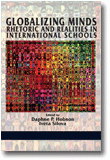
Globalizing Minds
Rhetoric And Realities In International Schools
Edited by:
Daphne P. Hobson, Global Teaching Consultants, LLC
Iveta Silova, College of Education, Lehigh University
Published 2014
Globalization has a profound effect on the mission and goals of education worldwide. One of its most visible manifestations is the worldwide endorsement of the idea of “education for global citizenship,” which has been enthusiastically supported by national governments, politicians, and policy-makers across different nations. Increasingly, the educational institutions feel under pressure to respond to globalization forces by preparing students to engage competitively and successfully with this new realm, lest their nations be left in the dust. What is the role of international schools in implementing the idea of “education for global citizenship”? How do these schools create a culturally unbiased global curriculum when the adopted models have been developed by Western societies and at the very least are replete with (Western) cultural values, traditions, and biases?
This collection of essays attempts to grapple with these complex issues, while highlighting that culture and politics closely intertwine with schooling and curriculum as parents, administrators, teachers, and students of different backgrounds and interests negotiate definitions of self and each other to construct knowledge in particular contexts. The goal is to examine the complexity of factors that drive the global demand for “education for global citizenship” and de-construct the contested nature of “global citizenship” by examining how the phenomenon is understood, interpreted, and modified in different cultural settings. The authors provide not only a thick description of their cases, but also a critical assessment of various attempts to initiate and implement educational reforms aimed at the development of globally-minded citizens in various national settings.
CONTENTS
PART I: INTRODUCTION. The Pedagogy and Politics of Global Citizenship in International Schools:Setting the Context, Iveta Silova and Daphne P. Hobson. Global Citizenship Education as Pedagogic Discourse, James Cambridge. PART II: GLOBALIZATION, CURRICULUM, AND PEDAGOGY. Where Is Global Citizenship? How International Schools Are Fulfi lling their Mission, Ian E. Sutherland, Darren Price, David Harris, and Luman Strong. The Infl uence of Service-Learning on the Development of Intercultural Sensitivity: A Case of an International School in Hong Kong, Jan M. Westrick. A Closer Look at Internationalism in International Education in the Philippines: A Journey Towards Authenticity, Maria Aurora Correa Bernardo and Sherylyne Almonte-Acosta. A Member of that Team: International School Students and their Need to Belong, Nigel Bagnall. A Glimpse into the Making of Global Minds: The International School Experience at the United Nations International School, Diane G. Gal and Judith E. King-Calnek. The International Baccalaureate and its “Second Era” of Ambitious Rhetoric: Wider Access and Greater Impact, Tristan Bunnell. PART III: GLOBALIZATION, CURRICULUM, AND POLITICS. American Curriculum in an Islamic Context: A Complex Adoption of Life Skills Education Program in Kuwait, Roger J. Douglas. Growing Globally-Minded Citizens in the Desert: A Comparative Curricula Analysis of Two Schools in Kuwait, Kelly Card and Rosalee van Staalduinen. A “Brand-New” Chinese Model of an International School in Shanghai: Patriotic Marketing and International Education Hegemony, Zejun Zhou. Global, European, or Local Citizenship? The Discursive Politics of Citizenship Education in Central and Eastern Europe, William C. Brehm and O. Colin Webster. Trans-Regional Regimes and Globalization in Education: Constructing the Neo-Caribbean Citizen, Tavis D. Jules. What Discursive Practices Can Reveal about “Being” Global: An Analysis of the Discourse of the International Baccalaureate Organization, Anna M. Hahn. By Way of Conclusion, Iveta Silova and Daphne P. Hobson. The Path to Globalizing Minds: Implications for Educational Approaches and Practices, Siegfried Ramler. About the Authors.
-
Paperback9781623965860
Web price: $45.04 (Reg. 52.99)
-
Hardcover9781623965877
Web price: $80.74 (Reg. 94.99)
- eBook9781623965884

-
 (Re)Envisioning Social Studies Education Research
Current Epistemological and Methodological Expansions, Deconstructions, and Creations
(Re)Envisioning Social Studies Education Research
Current Epistemological and Methodological Expansions, Deconstructions, and Creations
-
 American Educational History Journal - Golden Anniversary Edition
Volume 50 Numbers 1 & 2
American Educational History Journal - Golden Anniversary Edition
Volume 50 Numbers 1 & 2
-
 Distance Learning
Volume 20 #3
Distance Learning
Volume 20 #3
-
 Distance Learning
Volume 20 #4
Distance Learning
Volume 20 #4
-
 Faculty Development
Achieving Change Through Action Research
Faculty Development
Achieving Change Through Action Research
-
 Qualitative Research With Diverse and Underserved Communities
Qualitative Research With Diverse and Underserved Communities
-
 Quarterly Review of Distance Education
Volume 24 #1
Quarterly Review of Distance Education
Volume 24 #1

